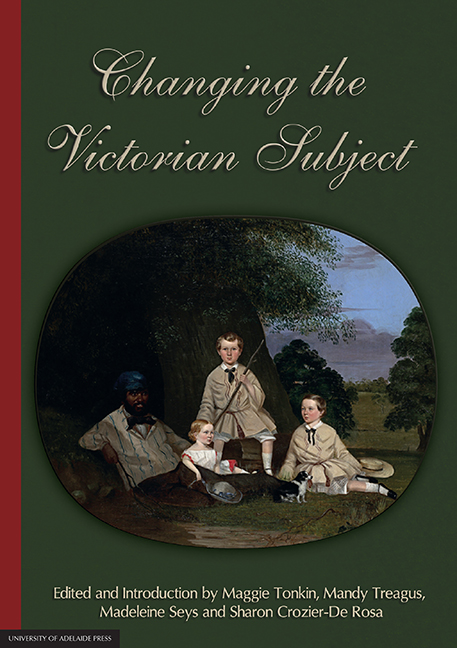Book contents
- Frontmatter
- Contents
- Notes on Contributors
- 1 Re-visiting the Victorian subject
- 2 Queen Victoria's Aboriginal subjects: a late colonial Australian case study
- 3 Identifying with the frontier: Federation New Woman, Nation and Empire
- 4 A ‘Tigress’ in the Paradise of Dissent: Kooroona critiques the foundational colonial story
- 5 The making of Barbara Baynton
- 6 A literary fortune
- 7 Olive Schreiner's From Man to Man and ‘the copy within’
- 8 Guy Boothby's ‘Bid for Fortune’: constructing an Anglo-Australian colonial identity for the fin-de-siècle London literary marketplace
- 9 The scenery and dresses of her dreams: reading and reflecting (on) the Victorian heroine in M.E. Braddon's The Doctor's Wife
- 10 The woman artist and narrative ends in late-Victorian writing
- 11 Miss Wade's torment: the perverse construction of same-sex desire in Little Dorrit
- 12 ‘All the world is blind’: unveiling same-sex desire in the poetry of Amy Levy
- 13 From ‘Peter Panic’ to proto-Modernism: the case of J.M. Barrie
12 - ‘All the world is blind’: unveiling same-sex desire in the poetry of Amy Levy
Published online by Cambridge University Press: 05 December 2014
- Frontmatter
- Contents
- Notes on Contributors
- 1 Re-visiting the Victorian subject
- 2 Queen Victoria's Aboriginal subjects: a late colonial Australian case study
- 3 Identifying with the frontier: Federation New Woman, Nation and Empire
- 4 A ‘Tigress’ in the Paradise of Dissent: Kooroona critiques the foundational colonial story
- 5 The making of Barbara Baynton
- 6 A literary fortune
- 7 Olive Schreiner's From Man to Man and ‘the copy within’
- 8 Guy Boothby's ‘Bid for Fortune’: constructing an Anglo-Australian colonial identity for the fin-de-siècle London literary marketplace
- 9 The scenery and dresses of her dreams: reading and reflecting (on) the Victorian heroine in M.E. Braddon's The Doctor's Wife
- 10 The woman artist and narrative ends in late-Victorian writing
- 11 Miss Wade's torment: the perverse construction of same-sex desire in Little Dorrit
- 12 ‘All the world is blind’: unveiling same-sex desire in the poetry of Amy Levy
- 13 From ‘Peter Panic’ to proto-Modernism: the case of J.M. Barrie
Summary
Amy Levy was a late-nineteenth-century British writer whose short life produced three novels, three collections of poetry, and numerous short stories and essays. She was active in the 1880s intellectual culture of Bloomsbury and acquainted with such figures as Olive Schreiner, Vernon Lee, the Black sisters, Eleanor Marx and Grant Allen. Levy's scholarly and creative writings reflect a keen awareness of contemporary literary and cultural movements, often prefiguring discussions regarding feminism and modernism which would not take place until after her death in 1889. In 1883, Levy published an essay in The Cambridge Review on the writings of James ‘B.V.’ Thomson, author of epic poem ‘The City of Dreadful Night’ (1874-1880). Levy observed of Thomson that
[h]e is distinctly what in our loose phraseology we call a minor poet; no prophet, standing above and outside things, to whom all sides of a truth (more or less foreshortened, certainly) are visible; but a passionately subjective being, with intense eyes fixed on one side of the solid polygon of truth, and realizing that one side with a fervour and intensity to which the philosopher with his birdseye view rarely attains. (501)
The narrative perspective that Levy alludes to here, a literary mode that eschews omniscience and distanced objectivity in favour of a ‘passionate’ partiality, is a technique she would later adopt in her third and final collection of poetry published in 1889 shortly after her death, A London Plane-Tree and Other Verse.
- Type
- Chapter
- Information
- Changing the Victorian Subject , pp. 241 - 258Publisher: The University of Adelaide PressPrint publication year: 2014



